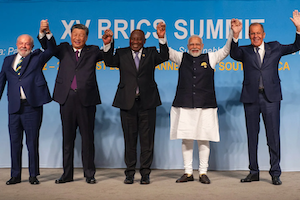BRICS Nations Approve 6 New Members
August 25, 2023 And now they have 11. The BRICS nations group has agreed to expand its membership, adding to its existing five members another six nations. As of Jan. 1, 2024, Argentina, Egypt, Ethiopia, Iran, Saudi Arabia, and the United Arab Emirates will be full functioning members of the BRICS group, a multilateral collection of countries that now includes Brazil, Russia, India, China, and South Africa. The name of the group is an acronym of the countries' names; the group dates to 2009. 
Heads of state of four of the five existing BRICS members made the announcement at a summit in Johannesburg, South Africa. The leaders were Luiz Inacio Lula da Silva of Brazil, Indian Prime Minister Narendra Modi, Xi Jinping of China, and the host nation's President, Cyril Ramaphosa. Attending via video link was Russian President Vladimir Putin, who faces an International Criminal Court warrant on war crimes in conjunction with his country's war with Ukraine. (Russian Foreign Minister Sergei Lavrov attended in person.) What remains unclear is whether the group's name will change again and, perhaps more fundamentally, how the inclusion of new members will affect the goings-on of the group. At the moment, the five member nations rotate the chairmanship among them in one-year terms. South Africa is this year's chair and so was the host country for the summit. The group also has a dedicated financial institution, the New Development Bank, which has four members that are not full members of BRICS. That will change in January when Egypt and the UAE join; still waiting are Bangladesh and Uruguay. Nearly two dozen other countries had either formally applied or expressed interest in joining BRICS. Group spokespeople did not explain the admittance decision-making process or criteria, other than to say that consensus among the existing members was needed in order for expansion to take place. Also at the South Africa summit, Chinese President Xi Jinping and Indian Prime Minister Narendra Modi will have a face-to-face meeting, their first such encounter since violence erupted along their shared border in 2020. Xi had also pushed hard for a BRICS currency, to counter the global reach of the American dollar; the other heads of state did not sign on to that proposal, preferring to maintain the current practice of recommending the use of local currencies in trade. The nations formed the group originally to coordinate efforts in economic cooperation. To some extent, BRICS has also functioned as an alternative to the West-dominated G-7. |
|
Social Studies for Kids
copyright 2002–2024
David White




